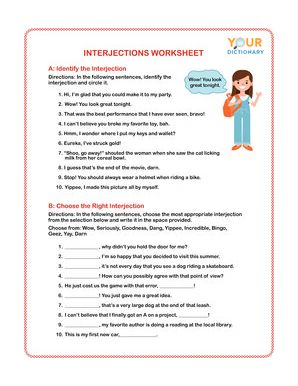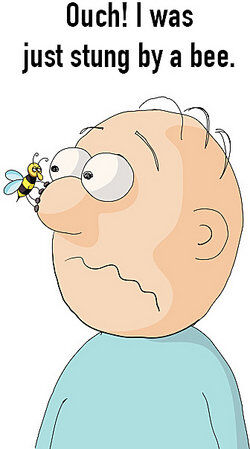

This interjections worksheet will create opportunities to practice using interjections in sentences. Interjections are one of the eight parts of speech. The other seven are nouns, pronouns, verbs, prepositions, adjectives, adverbs, and conjunctions.
Interjections are used to show emotion in a sentence. While they may not be popular in academic writing, they have their place in other forms of writing, including short stories.
Interjections Review
Interjections are often found at the beginning of the sentence. However, they can appear anywhere in the sentence, including the middle and the end.
Interjections are commonly followed by a comma or an exclamation point, depending on the strength of the emotion the writer would like to convey. From time to time, you might see writers use multiple exclamation points, possibly to infuse more energy into their words. Truthfully, though, only one exclamation point is necessary to convey emotion.
Examples of Interjections
Here are example sentences with the interjection in bold:
- Ouch! I was just stung by a bee.
- Hey, bring that back here.
- What do you mean that you can't visit, huh?
- I'm just a kid, gee whiz, not a professional athlete.
Because interjections have no connection with the rest of the sentence, their only real use is in quotations, including dialogue between characters in a book, or in informal writing, such as texting, blogging, or emailing friends and family. Interjections are rarely, if ever, used in business or academic writing where the tone should be formal.
Interjections as Onomatopoeia
Another fact about interjections is that they will often be onomatopoeic. Onomatopoeia is a word that imitates a sound, such as "woot," "doh," or "boo." These kinds of words are found in all languages; however, the same sound in different languages will follow the patterns of that language. Similarly, interjections in other countries depend on the culture and language.
Printable Interjections Worksheet
The interjections worksheet below is available as a downloadable and printable PDF document. It consists of two parts: identifying the interjection and choosing an appropriate interjection.

Part A: Identify the Interjection
Directions: In the following sentences, identify the interjection and circle it.
- Hi, I'm glad that you could make it to my party.
- Wow! You look great tonight.
- That was the best performance that I have ever seen, bravo!
- I can't believe you broke my favorite toy, bah.
- Hmm, I wonder where I put my keys and wallet?
- Eureka, I've struck gold!
- "Shoo, go away!" shouted the woman when she saw the cat licking milk from her cereal bowl.
- I guess that's the end of the movie, darn.
- Stop! You should always wear a helmet when riding a bike.
- Yippee, I made this picture all by myself.
Part B: Choose the Right Interjection
Directions: In the following sentences, choose the most appropriate interjection from the selection below and write it in the space provided.
Choose from: Wow, Seriously, Goodness, Dang, Yippee, Incredible, Bingo, Geez, Yay, Darn
- ______________, why didn't you hold the door for me?
- ______________, I'm so happy that you decided to visit this summer.
- ______________, it's not every day that you see a dog riding a skateboard.
- ______________! How can you possibly agree with that point of view?
- He just cost us the game with that error, ______________!
- ______________! You just gave me a great idea.
- ______________, that's a very large dog at the end of that leash.
- I can't believe that I finally got an A on a project, ____________!
- ______________, my favorite author is doing a reading at the local library.
- This is my first new car,_______________.
Answers for Part A:
- "Hi" is the interjection and is used as a greeting.
- "Wow" is the interjection and shows surprise.
- "Bravo" is the interjection and is also used as a way to congratulate the participants.
- "Bah" is the interjection and shows disappointment.
- "Hmm" is the interjection and a verbalization of a mental process.
- "Eureka" is the interjection and indicates excitement.
- "Shoo" is the interjection and is being used to verbally startle the cat.
- "Darn" is the interjection and shows disappointment.
- "Stop" is the interjection and ceases the forthcoming action.
- "Yippee" is the interjection and demonstrates excitement.
Answers for Part B:
Of course, the answers to the fill-in section can vary. Several of the options can fit more than one sentence. You could say, "Seriously," but I might say, "Geez." You might say, "Yay," and I'd say, "Wow." But for the purposes of the exercise we selected these answers:
- "Goodness" is the interjection, showing a certain level of upset.
- "Wow" is the interjection, showing delight.
- "Dang" is the interjection, showing amusement or surprise.
- "Seriously" is the interjection, showing shock or disapproval.
- "Darn" is the interjection, showing disappointment.
- "Bingo" is the interjection, showing excitement.
- "Geez" is the interjection, showing awe or surprise.
- "Incredible" is the interjection, showing delight.
- "Yay" is the interjection, showing extreme excitement.
- "Yippie" is the interjection, showing extreme delight.
Interject Life with Fun
Like many other elements of the English language, interjections are meant to be used sparingly. They work especially well in little bits of conversation if, for example, you're writing a short story. To see which interjection suits your writing best, check out this list of interjections.
This makes them similar to adjectives. When used in the right amount, they can add wonder to our writing. For more on them, take a look at this list of common adjectives.